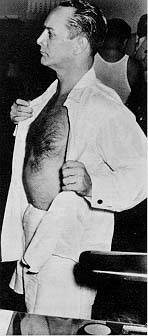Week 9 —History of Latin America
The Cold War from Left...
*************************************************************
Guatemala, 1954
- Juan José Arévalo (1944-50)
- Jacobo Arbenz (1950-54)
- 1952, land reform
United Fruit Company
John Foster Dulles (secretary of state)
Allen Dulles (CIA director)
John Moors Cabot (asst. secretary for Interamerican Affairs)
- 1952-53, Operations PBFortune and PBSuccess
- June 18-27, 1954, coup overthrows Arbenz

Cuba, 1959
I. Cuba on the eve of revolution
A. Underemployment, urban/rural split
B. Political disaffection: politiquería
- 1902, the Cuban Republic
- 1906-09, 1912, 1917-20, U.S. military occupation
- 1920s-30s:
Ramón Grau San Martín (1933)
Platt Amendment overturned (1934)
Fulgencio Batista (1934-44)
- 1940s-50s
Grau re-elected (1944-48)
Ortodoxos and Eduardo Chibás
1952, Batista takes power again
July 26, 1953, attack on Moncada Barracks
Fidel Castro,“History Will Absolve Me”
II. The Cuban Revolution, 1959
- broad support
- moderate early revolutionary government
- radicalization, 1960-62
1960, U.S. oil embargo
1960, French ship exploded
1961, Bay of Pigs
1962, Cuban Missile Crisis
III. Exporting the Revolution/Guerrilla Warfare
- Ernesto "Che" Guevara
- Regis Debray
- focos
- Bolivia 1967-68
- Central America 1960s-80s
Cuba as Inspiration
“For the first time we thought that revolution was something possible in our countries. Until then the idea of the revolution was romantic and remote to us, something we took more as an academic idea that could never become a reality in countries like ours.”
--Mario Vargas Llosa
I. Urban guerrillas
- Uruguay : Tupamaros, to 1974
- Argentina: Peronist Armed Forces (1950s-70s) and Montoneros (1970s)
II. Social Revolutionaries
A. Dependency theory
B. Student/university movement
- Mexico 1968
Student strikes/popular marches
Pre-Olympic Games
Oct. 2, 1968: massacre at Plaza de los Tres Culturas in Tlatelolco
C. Liberation theology
- Vatican II, 1962-65
- Medellin, 1968: "institutional" or "structural" violence = sin
- Puebla, 1979: “preferential option for the poor"
D. Grass-roots movements
- Christian base communities
- Neighborhood committees
- Cooperatives
- Women's movements
III. The Chilean Road to Socialism
- Military takeovers in South America
Ecuador (1963-67, 1972)
Brazil (1964)
Bolivia (1964)
Argentina (1968)
Uruguay (1967)
Peru (1968)
- Salvador Allende (1971-73)
- Sept. 11, 1973
